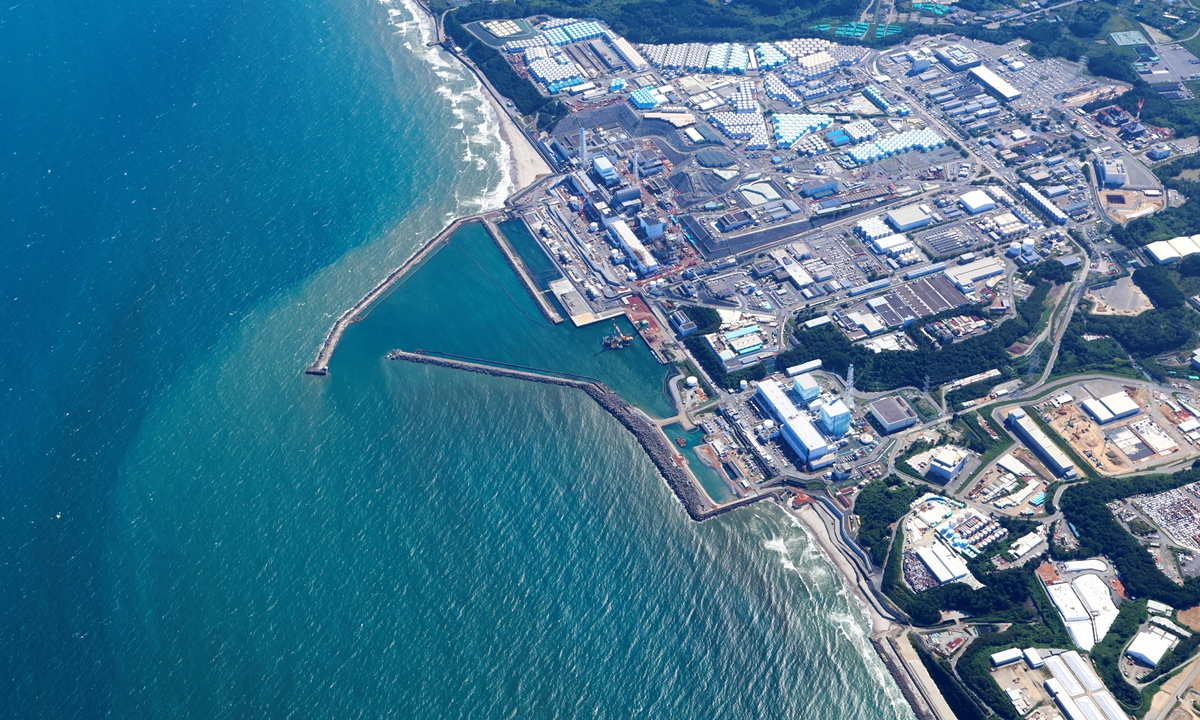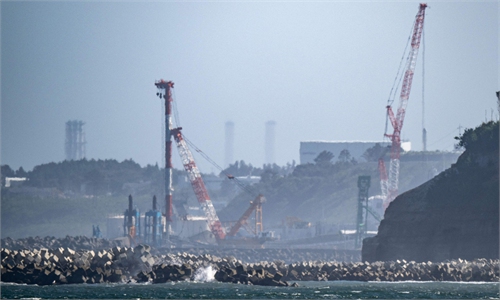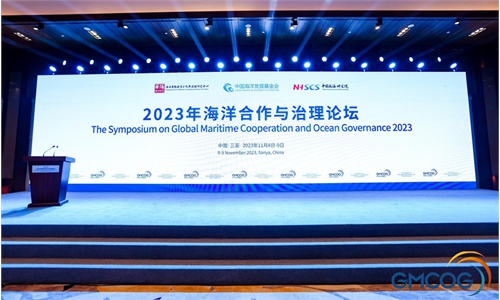Measures taken by China against dumping of nuclear-contaminated water by Japan are entirely reasonable and necessary: FM

Nuclear-contaminated wastewater is being dumped from the TEPCO Fukushima Daiichi nuclear power plant into the ocean. An aerial view showing that the discharge is causing discoloration in Okuma, Fukushima, Japan on August 24, 2023. Photo: VCG
The current measures taken by China and other relevant parties in response to the dumping of nuclear-contaminated water from Japan's Fukushima nuclear plant into the sea are completely justified and necessary, Chinese Foreign Ministry spokesperson Mao Ning on Monday said in response to whether the two countries would have the dialogue to address the issue.
China has agreed to address its ban on Japanese seafood through expert-level talks, Japanese Prime Minister Fumio Kishida said aftertalks withChinese President Xi Jinping in San Francisco.
China's position against the release of nuclear-contaminated water is consistent and clear, Mao said. "We hope that the Japanese side can work with China to properly handle the issue of the dumping of nuclear-contaminated water in a constructive manner."
Tokyo Electric Power Company TEPCO said that the third round of the dumping of nuclear-contaminated water at the Fukushima nuclear power plant has been completed at around noon on Monday, according to Japan Broadcasting Corporation (NHK).
The third round, which began on November 2, totaled 7,753 tons. The fourth round is expected to start early 2024, and the total cumulative dumping of the four emissions are about 31,200 tons, and 233,351 tons have already been discharged.
China's total imports of aquatic products from Japan in October were only 2.4 million yuan, a decrease of 99.3 percent from 325.79 million yuan in October 2022, according to data released by the General Administration of Customs (GAC) on Saturday.
This comes after China banned all aquatic products from Japan over Fukushima nuclear waste water dumping on August 24.
China's imports of seafood from Japan dropped to zero in September, according to data earlier released by the General Administration of Customs (GAC). It's noticeable that there is no recorded data of China importing meat, fish, and other aquatic invertebrate products from Japan in September.
The GAC announced on August 24 that China will halt all aquatic product imports from Japan after the Japanese government, in disregard of the strong criticism and opposition from international community, unilaterally started the dumping of the Fukushima waste water into the ocean.
The move aims to prevent the risk of radioactive contamination caused by the dumping of nuclear-contaminated wastewater from Fukushima to affect food safety, protect the health of Chinese consumers, and ensure the safety of imported food.
According to a press release from the Japanese Ministry of Foreign Affairs on September 4, Japan told the WTO that China's ban on Japanese seafood is "unacceptable," while asking China to cancel the measures.
In response, the Chinese Foreign Ministry said that it is entirely legitimate, reasonable and necessary for China to take emergency measures against imports of aquatic products from in Japan in accordance with Chinese laws and provisions of WTO agreement.
China is replacing Japanese seafood products with domestic or imported aquatic products from other countries. Chinese seafood companies, which are currently processing scallops from Japan such as Hokkaido, are also considering moving their factories to Southeast Asian countries including Thailand.
In addition to China, other countries including Russia have also adopted temporary restrictive measures against fish and seafood imports from Japan. The decision was taken as a "precautionary measure," and the restrictions would stay until Moscow is provided with comprehensive information that confirms the safety of Japanese fish and seafood products, Russia's Federal Service for Veterinary and Phytosanitary Supervision announced on October 16.
Global Times


